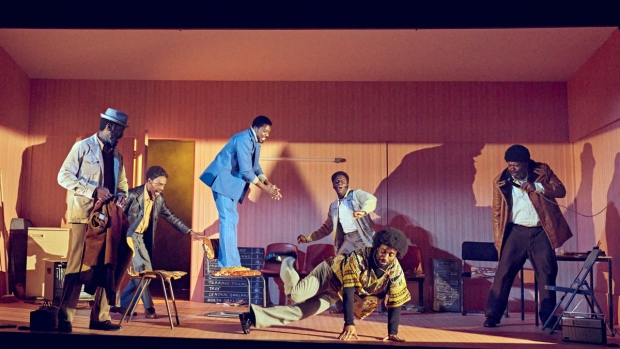Jitney at the Old Vic and on tour – review

© The Old Vic
No playwright is better than August Wilson in charting the way in which just as you think life is carrying you in one direction, it swerves to hit you with an unexpected outcome. I find I watch his work holding my breath, worrying about what will happen next. It grips and holds.
Jitney was the first play he wrote in what became his great American Century Cycle, ten plays set in the Hill District of Pittsburgh where he grew up, each story taking place in a different decade. It was written in 1979 (though much revised) and set in 1977 in a cab office – a jitney is the name given to the unlicensed taxis that gave the urban black community a low-cost means of getting around.
The drivers gather in the station, waiting for a ride, chatting about their lives. Quickly they are differentiated. There's the upright boss Becker (Wil Johnson), a man with a strong sense of the rules, and Fielding (Tony Marshall), who breaks them. There's Turnbo (Sule Rimi), a gossip who has never seen a situation in which he doesn't want to interfere and is less genial than he first appears, and Youngblood (Solomon Israel), who is more grounded and kinder than his outward shows.
Geoff Aymer's Doub, meanwhile, just wants to read his book and be left in peace and numbers runner Shealy (Nnabiko Ejimofor) only pops in to show off his latest moves and get calls on the payphone from his girlfriend.
Out of these characters and their easy-going chat, Wilson builds a richly textured picture of a community under threat – from the developers who are moving in to knock down the block, and from poverty, and their own need to cling on in a situation where they are all on the margins in varying ways.
The great central section of the play contains a confrontation between Becker and his estranged son Booster, released from prison after serving a 20-year term for the murder of a white girlfriend who falsely accused him of a rape. In their pain-filled confrontation, Wilson mines agonising choices. Becker feels his son has thrown his life away by his refusal to compromise; Booster responds: "You put one wrong after the other and never get to a right."
It's Wilson's greatness as a writer that both sides of the argument seem full of merit; he writes about complexity without offering easy solutions. On press night, Johnson's finely-etched and worn-down Becker, a man weighted by his own righteousness, was matched by the understudy Blair Gyabaah, making his stage debut, as Booster. His quiet sense of self on stage was impressive.
But every performance is outstanding in Tinuke Craig's sensitive and lively production right down to the smaller characters such as Dayo Koleosho's regular passenger to the only woman in the piece, Leanne Henlon's long-suffering Rena. Rimi's performance as Trunbo is extraordinary, combining charm with a real sense of danger; he dances through the night, behaving at times like the child Doub accuses him of being, jumping in frustration, stamping his feet in barely concealed rage.
There's lovely work too from Israel who makes the Vietnam vet Youngblood an amalgam of arrogance and uncertainty, trying to do the right thing and yet somehow getting it wrong.
Every detail of stage and scene in this co-production with Leeds Playhouse and Headlong is lovingly right. Alex Lowde's battered box-like office set has ill-matching chairs and patterned cushions; his costumes are a careful mix of fashionable kaftans and flares for Youngblood and Shealy and older-fashioned sheepskins and leathers for the older men.
It feels convincing, as does the dialogue that swings between banter about whether Lena Horne or Sarah Vaughan is prettier, to deeper questions about why a young boy would steal his grandmother's TV.
Towards the close, when Wilson tries to tie things together, the play becomes more predictable and less convincing plot-wise. But the reality created, the sense of a group of men bound together by ties of work not of friendship, trying to live their lives as best they can, lingers long into the night. It's a fine production of a fascinating play.












